Chickens have a reputation for being profoundly dumb, but in fact they are remarkably intelligent and may even be empathic.
Reputation: Chickens are dumber than your average bird – little more than walking meat factories with a talent for laying tasty eggs
Reality: The world's most common bird is actually intelligent, and perhaps even sensitive to the welfare of its peers – which might raise some uncomfortable ethical questions for the farming industry.
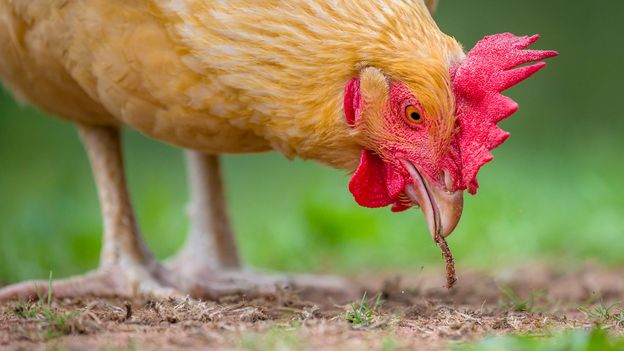
How much brain does pecking at seeds even take? (Credit: Klein & Hubert/naturepl.com)
There is something odd about chickens. Globally they number more than 19 billion, making them one of the most abundant vertebrate species on the planet. Yet many people have little or no contact with the birds – at least, not while they are alive.
Chickens can count, show some level of self-awareness, and even manipulate one another.
That has led to some strange assumptions about chickens. According to some studies, people can struggle even to see them as typical birds. They are, in fact, reasonably representative of the galliformes, a bird group that also includes turkeys, partridges and pheasants.
It is also common for people to view chickens as unintelligent animals that lack the complex psychological characteristics of "higher" animals like monkeys and apes. This is a view reinforced by some depictions of chickens in popular culture, and one that might help people feel better about eating eggs or chicken meat produced by intensive farming practices.
But chickens are, in fact, anything but dumb.
They can count, show some level of self-awareness, and even manipulate one another by Machiavellian means. In fact, chickens are so smart that even a limited amount of exposure to the living birds can crush longstanding preconceptions.
I never thought that chickens would be intelligent enough and learn quite so quickly.
For a study published in 2015, Lisel O'Dwyer and Susan Hazel ran a class for undergraduates at the University of Adelaide, Australia. As a way to learn about psychology and cognition, the students performed experiments that involved training chickens.
Before the class began, the students completed a questionnaire. Most said they had previously spent little time with chickens. They viewed them as simple creatures, unlikely to feel boredom, frustration or happiness.
After just two hours training the birds, the students were far more likely to appreciate that chickens can feel all three of these emotional states.
"Chickens are a lot smarter than I originally thought," commented one student on a follow-up questionnaire. Another said: "I never thought that chickens would be intelligent enough and learn quite so quickly."
A male junglefowl (Gallus gallus), domestic chickens's closest wild relative (Credit: Tony Heald/naturepl.com)
In as-yet-unpublished research, O'Dwyer has replicated this study with workers in the poultry industry, and found the same results. "Basically we had two quite different social groups and found the same [initial] attitudes and the same attitude change in both," she says.
The researchers have shown that chickens can count and perform basic arithmetic.
She now plans to study whether these experiences have any impact on people's eating habits – for instance, whether they shift to eating chicken reared in ways that they believe to be more ethically acceptable.
O'Dwyer's study is just one of many picked out by Lori Marino of the Kimmela Center for Animal Advocacy in Kanab, Utah, as part of a scientific review of chicken cognition published in January 2017.
"The paper is part of a joint venture between Farm Sanctuary and The Kimmela Center, called The Someone Project," says Marino. "The aim of the Project is to educate the public about who farmed animals are from the scientific data."
Marino says the scientific evidence shows clearly that chickens are not as unaware and unintelligent as many people assume.
Take, for instance, a suite of papers published over the last decade by Rosa Rugani at the University of Padova, Italy, and her colleagues. Working with newly-hatched chicks, the researchers have shown that chickens can count and perform basic arithmetic.
Chickens may also have some ability to perform "mental time travel"
The chicks were raised from hatching with five objects – the plastic containers from Kinder Surprise eggs. After a few days, the scientists took the five objects and, in full view of the chicks, hid three behind one screen and two behind a second screen. The chicks were more likely to approach the screen hiding more of the objects.
A follow-up experiment tested the chicks' memory and ability to add and subtract. After the objects had been hidden behind the two screens, the scientists began transferring objects between the two screens, in view of the chicks. The chicks seemed to keep track of how many objects were behind each screen, and were still more likely to approach the screen that hid the larger number of objects.
Chickens have a strong grasp of numerical tasks from a young age, even if they have limited experience, says Rugani.
She thinks that might be true of higher animals in general, rather than chickens in particular. "These abilities would help animals in their natural environment, for example to reach a larger amount of food, or to find a larger group for social companionship," she says.
If a male chicken foraging for food finds a particularly tasty morsel, he will often try to impress nearby females by performing a dance.
Chickens may also have some ability to perform "mental time travel" – that is, to imagine what will happen in the future – to secure a larger amount of food, according to a 2005 study led by Siobhan Abeyesinghe, then at the University of Bristol, UK.
Abeyesinghe gave chickens the option of pecking one key, which would give brief access to food after a two-second delay, or pecking a second key that gave prolonged access to food after a six-second delay.
The birds were significantly more likely to peck at the second key, which offered a greater food reward but after a longer delay time. In other words, they showed self-control – a trait that some biologists think hints at a degree of self-awareness.
Chickens are also socially complex.
Some studies suggest the birds can appreciate how the world must appear to their peers, and that they can use this information for personal advantage.
Females quickly wise up to males who perform this sort of deception too often
If a male chicken foraging for food finds a particularly tasty morsel, he will often try to impress nearby females by performing a dance while making a characteristic food call.
However, subordinate males that perform this song-and-dance routine risk being noticed and attacked by the dominant male. So if the dominant male is nearby, the subordinate often performs his special dance in silence, in a bid to impress females without the dominant male noticing.
Meanwhile, some males may try to trick females into approaching by making the characteristic food calls even when they have not found anything worth crowing about. Unsurprisingly, females quickly wise up to males who perform this sort of deception too often.
There are even some hints that chickens may show a rudimentary form of empathy for each other.
In a series of studies over the last six years, Joanne Edgar at the University of Bristol, UK and her colleagues have studied how hens react when they see their chicks having air puffed at them – something the hens have learned, from personal experience, is mildly unpleasant.
Hens can respond to their personal knowledge of the potential for chick discomfort
When the chicks were puffed, the hens' hearts began to race and they called more frequently to the chicks. However, they did not do so if the air was puffed near the chicks without actually disturbing them.
In a study published in 2013, the hens learned to associate one coloured box with the uncomfortable air puff and a second coloured box with safety – no air puff. The hens again showed signs of concern when chicks were placed in the "dangerous" box, even if the chicks never actually experienced an air puff and remained oblivious to the peril.
This suggests that hens can respond to their personal knowledge of the potential for chick discomfort, rather than simply reacting to signs of distress in the youngsters.
The research is ongoing, says Edgar. "We have not yet established whether the behavioural and physiological responses in hens observing their chicks in mild distress are indicative of an emotional response, or are simply akin to arousal or interest."
When the chicks were puffed, the hens' hearts began to race and they called more frequently to the chicks
If it does turn out that chickens can show empathy when other birds are in distress, that could raise serious questions about the way farmed chickens are reared.
"There are numerous situations where all farm animals are exposed to the sights, sounds and smells of other individuals showing signs of pain and distress," says Edgar. "It is important to determine whether their welfare might be reduced at these times."
Marino also thinks it may be time to discuss these questions. "The perception of chickens [as unaware and unintelligent] is driven in part by the motivation to dismiss their intelligence and sensibilities because people eat them," she says.
The
uncomfortable truth about chickens is that they are far more cognitively
advanced than many people might appreciate. But it remains to be seen
whether consumers who are armed with this knowledge change their
shopping habits at the meat counter.
I must admit that I have changed my meat and poultry eating habits and do not eat as much as I used to, I try to have a meat free day once a week! We are lucky here on Menorca to have easy access to free range chickens and eggs.
We do all need to try and eat less meat for the good of the planet and many people are doing this. There are a lot more meatless products available and some of them are really good.
The blog song for today is:" Rock the Casbah" by The Clash.
TTFN


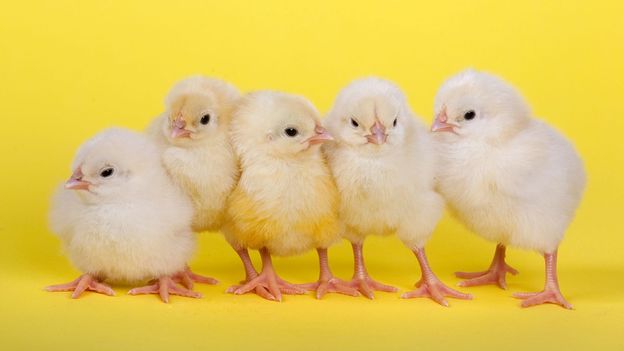
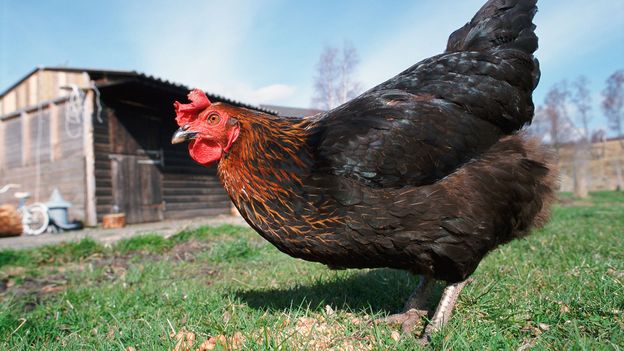
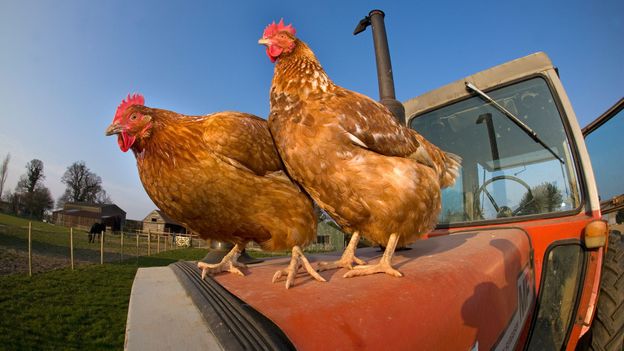

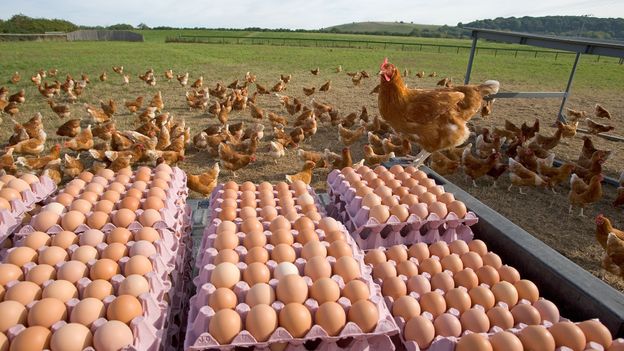


No comments:
Post a Comment